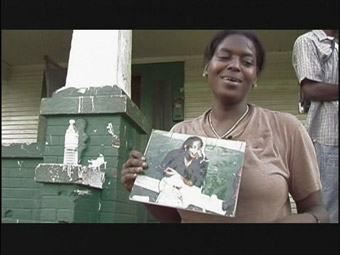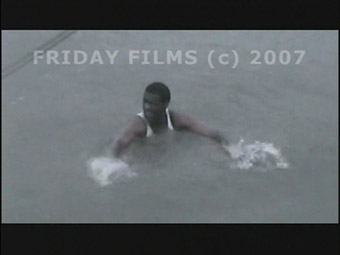|
For me, there's always been something particularly appealing about the personal documentary, a subgenre that explores an issue or event not from the viewpoint of an investigative outsider but through the experiences of those directly involved in it, those who in regular documentaries become bit-part players whose contributions are whittled down to a few words of interview. Inevitably, this does not result in that balanced viewpoint that some still argue documentary films should have but rarely if ever do – here there is no question that the tsory is being told through biased eyes, and balancing arguments from the opposing side cut no real ice. Such films thus by definition tend to be narrower in their coverage than their supposedly more objective brethren, and focus more on the emotion of experience than the facts and figures of the situation in question, their main aim being not to provide an overall picture of an event, but to document what it was like to be there when it happened.

The 2005 landfall of Hurricane Katrina left its mark not just on New Orleans, which bore the full brunt of its force, but on the American conscience. Plans to evacuate the region were poorly implemented and relied almost exclusively on citizens making their own way out in privately owned vehicles, which left a substantial number of those without their own transport to stay put and attempt to ride out the storm. When the hurricane hit, the region's system of protective levees suffered a catastrophic series of breaches, which spilled flood water into the low-lying streets, killing over seven hundred people and trapping survivors in their attics and on the roofs of their houses. The slow pace and disorganised nature of the government response became a national scandal, with many suggesting that it would have been far more immediate and effective had the worst hit areas been populated by the wealthy and white instead of the poor and black.
None of which should be exactly news to anyone reading this, of course. The full story of the disaster and its aftermath has been extensively covered by newspapers, books and TV and even explored in phorensic detail in Spike Lee's superb four-hour HBO special, When the Levees Broke. Trouble the Water tells the story from an almost exclusively personal perspective, that of aspiring rap artist Kimberly Rivers Roberts and her husband Scott. Without the means to evacuate, Kimberly turned her camcorder on herself and her local community to capture the build-up to Katrina's arrival and its eventual landfall. A chance meeting two weeks later with professional filmmakers and Michael Moore associates Carl Deal and Tia Lessin at a shelter for Katrina victims led to her footage forming the basis for this very film. And although inevitably narrow in focus and ragged at the edges, it's really quite something.
Kicking off with that chance encounter with Deal and Lessin, the film alternates between Kimberly's earlier footage of the hurricane's approach and arrival and material subsequently shot by cameraman P.J. Raval of the Roberts' return to their devastated community a short while after the waters have subsided. Roberts is no professional filmmaker, and the camerawork in her early wander around the neighbourhood can be a little seasick-inducing if you're watching on a big TV (try a cinema screen for maximum effect), but it's a nonetheless crucial inclusion, setting up the pre-storm situation and her easy-going relationship with her neighbours, one of whom we will be prompted to recall on her later return to the district. But it's her footage of the hurricane's arrival that proves the most arresting, as the wind increases and the waters begin to rise and she and her family take urgent refuge in the attic. Her camera's first daytime glimpse through an upstairs window is genuinely startling, with the street outside transformed into a river that even road signs are disappearing beneath. The footage even has its own action hero in the shape of Scott's brother Robert, who swims from house to house using a punch-bag as a float to transport people two at a time to a communal property on higher ground.

If Deal and Lessin's footage lacks the drama and immediacy of Roberts' own material then it still delivers some memorable moments, not least when Kimberly, Scott and friend Brian begin checking the abandoned houses in her neighbourhood for survivors. It's also here that they get to fill in the parts of their survival story that were not caught on Kimberly's camera (we have to presume that the battery eventually failed), a journey that involves some surprisingly amicable interaction with incumbent National Guardsmen. Separate the two parties, however, and it's a different story, with one guardsman rather heartlessly remarking "No offence to civilian people, but they have no concept of how to survive," while Kimberly says as they leave the now idle soldiers, "I wish they was camped out and doing all this when we needed 'em. What's the purpose now? Now they're just sitting on their ass. Waiting on something violent to happen so they can shoot us."
The drama and sense of injustice doesn't end there, but it would be wrong to reveal all of the film's sometimes sobering surprises. Wider context is intermittently provided by extracts of news reports, which usefully illustrate the sheer scale of the levee breaches and the numbers of those trapped by the waters, while political points are made by a few nicely timed edits (George Bush really is a gift to filmmakers here). The helplessness of those trapped is heartbreakingly illustrated by recordings of calls made to the emergency services, where pleads for assistance are met with the news that there simply is none. But there are also some unexpectedly upbeat moments, few more so than Kimberley's retrieval of her mother's picture (see the film to understand its importance to her) and the couple's re-unification with their presumed lost dogs.
One of the most arresting scenes of all occurs late in the film, when seemingly on a whim Kimberly electrifyingly accompanies one of her own songs to camera and her good-natured optimism temporarily recedes to allow an underlying anger at her social situation to bubble to surface. It's a compelling performance from a woman of real talent and extraordinary determination, and it's she who provides the film with its considerable heart and backbone. When the Levees Broke may present a considerably more comprehensive and detailed account of the disaster, but in so effectively personalising the experience, Trouble the Water should be considered an essential companion piece.
Given that the film is a blend of high-band video, hand-held mini-DV, mobile phone footage and grabbed news material, the picture quality was always going to vary and never be pristine, particularly on a UK disc where the whole lot then had to be standards converted from NTSC to PAL. Adding to the resolution issue is that this is a letterboxed widescreen print rather than an anamorphic one, which softens the detail and contrast even on Deal and Lessin's material, while the standards conversion provides a fair few inevitable motion judders. Within these restrictions the transfer is solid enough and certainly never detracts from the content.

One issue I can't testify to regarding the release disc is the intermittent appearance of a Friday Films copyright notice in large translucent white type. Although I'm used to seeing such notices on review discs as a piracy prevention measure, the one here is specific to Kimberley's footage and her to-camera performance – it disappears on a cut to news footage, for example – and thus may be on the release print as well.
The Dolby stereo 2.0 soundtrack only really kicks to stereo at all with the music. For the most part this is monaural and as clear as situations allow, with dialogue recording at its clearest on Deal and Lessin's material, although Kimberly's proximity to the camera ensures her comments are always caught during her own footage.
Nothing. A major missed opportunity I have to say.
A gripping and important personal documentary that has already had its first UK TV screening, which takes the edge off a disc with a non-anamorphic picture and no extra features. But if you missed it then and on its cinema run, then ICA's DVD does provide bare bones access to the film at a reasonable price. Recommended for the film, but the disc could have been better.
|